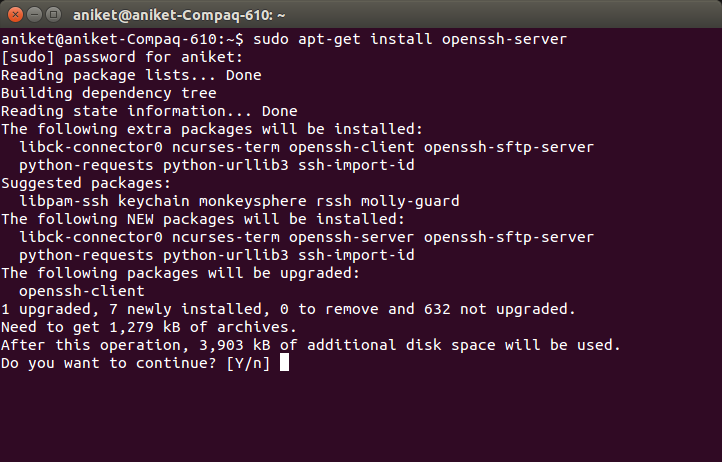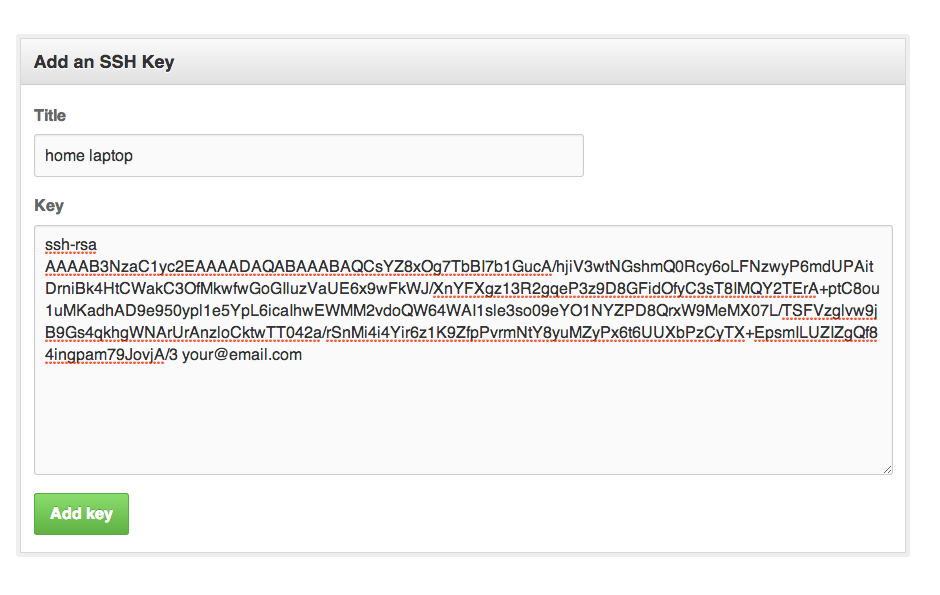Key management with ssh-add, ssh-keysign, ssh-keyscan, and ssh-keygen. The service side consists of sshd, sftp-server, and ssh-agent. OpenSSH is developed by a few developers of the OpenBSD Project and made available under a BSD-style license. Ssh-keygen is a tool available default in linux used to create a ssh authentication key pairs. Ssh-keygen can create RSA keys, DSA keys, ECDSA keys, ED25519 keys. By default, ssh-keygen will generate an RSA key pairs with one public and private key. Download PuTTY. PuTTY is an SSH and telnet client, developed originally by Simon Tatham for the Windows platform. PuTTY is open source software that is available with source code and is developed and supported by a group of volunteers.
I run git push -u origin master
It tells me that 'Permission denied (public key) fatal: The remote end hung up unexpectedly'
Then I looked up on the internet and found that I had to generate an ssh key for my account on GitHub. However, upon doing so, when I tried to do ssh-keygen -t rsa 'email@youremail.com' it simply said ssh-keygen is not recognized. I tried doing mkdir C:ssh but that didn't work. If it helps I'm using Ruby Rails and I'm on a Windows computer. Could anyone help me?
culix user1567909user1567909
user1567909user156790914 Answers
Ssh Keygen Github
2012:ssh-keygen.exe is part of msysgit:
if your %PATH% includes C:pathtomsysgit1.7.11bin, you will have ssh-keygen.
Update 2015:ssh-keygen.exe is part of Git For Windows, whose releases include PortableGit-2.4.3.1-2nd-release-candidate-64-bit.7z
That means the %PATH% must include c:pathtoPortableGit-2.4.3.1-2nd-release-candidate-64-bitusrbin (without the ssh-keygen.exe)
As I explained before, Git for Windows will soon phase out msysgit.
I detailed in 'Why is it that if you download Git 2.0 from the net, you always get a 1.9.4 installer package?' how this new version is based on the more recent msys2 project.

I just had this issue and thought I'd share what I thought was an easier way around this.
Open git-bash and run the same command with the addition of -C since you're commenting in your email address: ssh-keygen -t rsa -C 'email@youremail.com' command. That's it.
git-bash should have been installed when you installed git. If you can't find it you can check C:Program FilesGitGit Bash
The first time I did this it failed to create the .ssh folder for me so I had to open a standard Command Prompt and mkdir C:Usersyourusername.ssh
Ssh Keygen Windows
I followed below in windows (With Git for Windows installed)
- Run 'Git Gui' (Start --> Git --> Git Gui)
- Click Help and then Show SSH Key
- Click Generate Key if you do not have one already
Note:- this creates the key files under your personal profile folder C:UsersYourUserID.ssh
I found an easy solution to fix this :
In the command prompt, go to your gitbin directory,and then execute your commands from here
No need to add anything to environmental variables! Just open up git bash and perform command the ssh-keygen in there.
Link to download git bash here
If you have installed Git, and is installed at C:Program Files, follow as below
- Go to 'C:Program FilesGit'
- Run git-bash.exe, this opens a new window
- In the new bash window, run 'ssh-keygen -t rsa -C'
- It prompts for file in which to save key, dont input any value - just press enter
- Same for passphrase (twice), just press enter
- id_rsa and id_rsa.pub will be generated in your home folder under .ssh
Just go to heroku.bat and add:
@SET PATH='D:Program Files (x86)Gitbin';%PATH% after @SET PATH=%HEROKU_RUBY%;%PATH%
in my case it's in D:Program Files (x86)Gitbin, change it to the path you've installed Git to. (i just left it with my path so it will be clearer on how to write this)
VladSshd Keygen
VladI think you can add the location of the file ssh-keygen.exe in the PATH environment variable. Follow the steps: Go to My Computer->Right click->Properties->Advanced System Settings->Click Environmental Variables. Now click PATH and then click EDIT. In the variable value field, go to the end and append ';C:pathtomsysgit1.7.11binssh-keygen.exe' (without quotes)
Nehal J WaniNehal J Wanidon't do anything just type in your command prompt
then you got like this
this should must work.
You probably should check this. Windows doesn't have that command built in.
 Benjamin Tan Wei HaoBenjamin Tan Wei Hao
Benjamin Tan Wei HaoBenjamin Tan Wei HaoSsh-keygen Windows
emixWhat Is Sshd-keygen-wrapper
I got it fixed by just adding ssh-keygen to my environment variables.
for those who does not choose BASH HERE option. type sh in cmd then they should have ssh-keygen.exe accessible
In my machine, ssh-keygen was available from powershell.